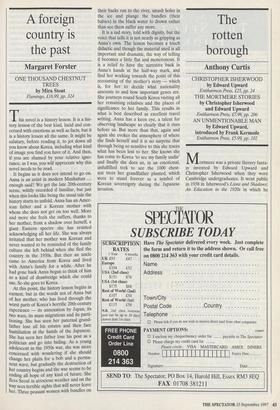A foreign country is the past
Margaret Forster
ONE THOUSAND CHESTNUT TREES by Mira Stout Flamingo, £16.99, pp. 324 This novel is a history lesson. It is a his- tory lesson of the best kind, lucid and con- cerned with emotions as well as facts, but it is a history lesson all the same. It might be salutary, before reading it, to jot down all you know about Korea, including what kind of image you find you have of it. And then, if you are shamed by your relative igno- rance, as I was, you will appreciate why this novel needs to be read.
It begins as it does not intend to go on. Anna is an artist in modern Manhattan ... enough said? We get the late 20th-century scene, wittily recorded if familiar, but just when this looks like being the usual tale the history starts to unfold. Anna has an Amer- ican father and a Korean mother with whom she does not get on too well. More and more she feels she suffers, thanks to her mother, from a shadow over herself, a giant Eastern spectre she has resisted acknowledging all her life. She was always irritated that her mother was Korean and never wanted to be reminded of the family culture she left behind when, she fled the country in the 1950s. But then an uncle came to America from Korea and lived with Anna's family for a while. After he had gone back Anna began to think of him as a kind of drawbridge which she could use. So she goes to Korea. At this point, the history lesson begins in earnest, but in the words not of Anna but of her mother, who has lived through the worst parts of Korea's horrific 20th-century experience — its annexation by Japan, its two wars, its mass migrations and its parti- tioning. She has seen her paternal grand- father lose all his estates and then face humiliation at the hands of the Japanese. She has seen her father lose his post as a politician and go into hiding. As a young adolescent in the 1950s war, she was more concerned with wondering if she should change her plaits for a bob and a perma- nent wave, but gradually the destruction of her country begins and the war seems to be ending all hope of any kind of future. She flees Seoul in atrocious weather and on the way sees terrible sights that will never leave her. Three peasant women with bundles on their backs run to the river, smash holes in the ice and plunge the bundles (their babies) in the black water to drown rather than see them suffer any more.
It is a sad story, told with dignity, but the voice that tells it is not nearly as gripping as Anna's own. The lesson becomes a touch didactic and though the material used is all important and dramatic, the way of telling it becomes a little flat and monotonous. It is a relief to have the narrative back in Anna's hands at the half-way mark, and find her working towards the point of this recounting of the mother's story — which is, for her to decide what nationality amounts to and how important genes are. She journeys round South Korea visiting all her remaining relatives and the places of significance to her family. This results in what is best described as excellent travel writing. Anna has a keen eye, a talent for observing landscape so clearly that it rises before us. But more than that, again and again she evokes the atmosphere of where she finds herself and it is no surprise that through being so sensitive to this she traces what has been lost to her. She knows she has come to Korea 'to see my family undie' and finally she does so, in an emotional, unfulfilled trek to see the 1000 chest- nut trees her grandfather planted, which were to stand forever as a symbol of Korean sovereignty during the Japanese invasion.


































































 Previous page
Previous page